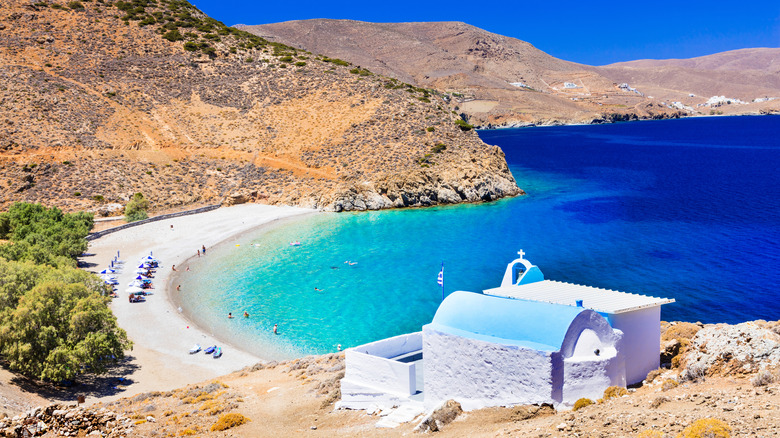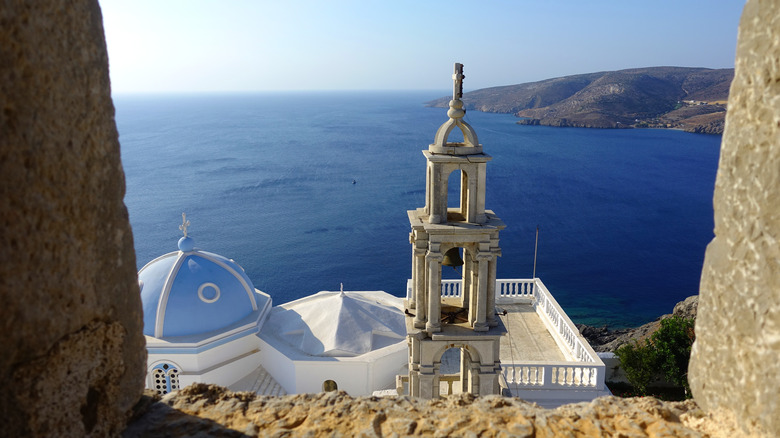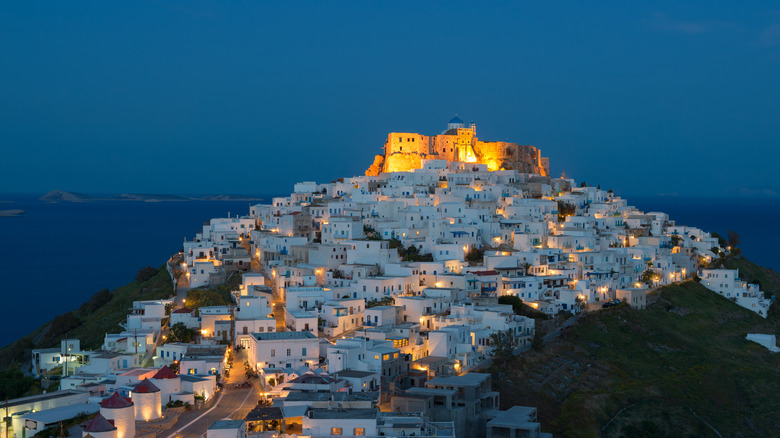With its sparkling beaches, white houses, and lively tavernas, you would be forgiven for thinking that Astypalaia Island is part of the sun-soaked Cyclades with Santorini or Paros. But in fact, this destination is part of the Dodecanese chain of islands in the Aegean Sea. Despite its beauty and warm hospitality, it still manages to fly under the radar (at least for now), keeping the town as authentic and traditional as one would hope to find.
Astypalaia (also spelled Astypalea) is known as the “Butterfly of the Aegean” due to its unusual shape. From above, the island looks like a set of wings, connected by a thinner landmass in the center. The Chora — the common Greek word for the main town on an island — is framed by each half, sitting in the “body” of the butterfly, so to speak. Upon arrival, prepare to be stunned by its beauty, with blue-domed chapels, whitewashed windmills, and narrow cobblestone streets. At the top of the hill, there’s a Venetian castle from the 12th century. This striking centerpiece is lit up at night, casting a warm glow over the cubic homes below. Make this your first stop, as the site offers a panoramic view worth the trek.
Things to do on Astypalaia Island

No trip to a Greek Island would be complete without staking out some of the local beaches, and Astypalaia is no exception. The most popular beaches are Livadi, Agios Konstantinos, and Pera Gialos, all of which have golden sand, turquoise water, and secluded spots that you can hog all to yourself — a true rarity in Greece. Some beaches have sunbeds and umbrellas, while others are free of facilities, but it’s a small price to pay for so few people around. While you’re in Pera Gialos, a small fishing village, don’t forget to duck into the Lettuce Bakery, which serves the famous yellow cookies this island is known for. They are made of milk, cheese, butter, almond, thyme, olive oil, and saffron, the spice that gives the cookies their signature hue.
Next on the list are landmarks. Located just below the castle, the Church of our Lady Portaitissa is another favorite. The structure was built in the 18th century by a half-blind monk, who labored over the building for nine years before its completion. History buffs will love the Archaeological Museum of Astypalaia, which houses artifacts from the prehistoric period to the middle ages. Round out your trip to this idyllic Greek locale with a hike to Negrou Cave, a natural wonder that once served as a mysterious hiding spot for pirates, according to local lore. While you may not find any buried treasure, you will find an impressive assortment of stalactites and stalagmites.
What to know before you go

Compared to other cities, transport options to the island are a bit more limited. Blue Star Ferries offers service from the Piraeus port in Athens direct to Astypalaia on Sundays for $49 one way (returns are on Tuesdays). The journey takes 8 hours and 10 minutes. If you’re hoping to reach paradise quicker, Sky Express offers direct, one-hour flights from Athens (ATH) to Astypalaia (JTY) on Tuesdays, Thursdays, Fridays, and Sundays for $103 to $122, depending on what time of year you visit.
Once you arrive, you’ll have plenty of options for accommodations. Since Astypalaia is still off the beaten path, you won’t find any big chains and resorts — it’s just not that kind of place. Instead, you’ll find boutique hotels owned by local families, adding another layer of charm to this quaint getaway. There are several ways to get around the island, via rental car or motorcycle, taxi, public buses, scooters, e-bikes, or good old walking. You’ll also see plenty of electric cars as well, which is unique from other islands, thanks to a recent agreement with the Volkswagen Group. As if you needed one more reason to visit, the government is hoping to turn the island into a model for sustainability. With far fewer crowds than other nearby hotspots, but no less things to do, save a spot for this Greek Island on your bucket list.

